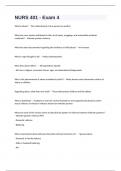NURS 401 - Exam 4
What is abuse? - The maltreatment of one person by another
What are more injuries attributed to than to all rapes, muggings, and automobile accidents
combined? - Intimate partner violence
What has been documented regarding the incidence of child abuse? - An increase
What is rape thought to be? - Vastly underreported
Who does abuse affect? - - All populations equally
- All races, religions, economic classes, ages, and educational backgrounds
Why is the phenomenon of abuse considered cyclical? - Many abusers were themselves victims of
abuse as children
Regarding abuse, what laws now exist? - Those that protect children and the elderly
What is battering? - A pattern of coercive control founded on and supported by physical and/or
sexual violence or threat of violence toward an intimate partner
What are some of the various terms to describe the pattern of violence between intimate partners? -
- Intimate partner violence (IPV)
- Domestic violence
- Battering
What may physical abuse between domestic partners be known as? - - Spousal abuse
- Domestic or family violence
- Wife or husband battering
- IPV
,Who is the vulnerable person in most instances of family violence? - A female partner, but the male
partner can also be a vulnerable person
What are vulnerable persons at the greatest risk for when they try to leave the relationship? -
Violence
What tends to increase the likelihood of violence toward the intimate partner? - Pregnancy (reason
unclear)
Regarding intimate partner violence, what is the profile of the victim? - - Battered women represent
all age, racial, religious, cultural, educational, and socioeconomic groups
- Low self-esteem
- Inadequate support systems
- Some grew up in abusive homes
Regarding intimate partner violence, what is the profile of the victimizer? - - Low self-esteem
- Pathologically jealous
- "Dual personality"
- Limited coping ability
- Severe stress reactions
- Views spouse as a personal possession
Regarding intimate partner violence, what are the three distinct phases in the cycle of battering? - -
Phase I: tension-building phase
- Phase II: acute battering incident
- Phase III: calm, loving, respite (honeymoon) phase
Regarding intimate partner violence, what occurs during phase I (tension-building phase) of the cycle
of battering - - They're abusive, but it's usually kind of like pushing, maybe a smack
- It's almost as if they're testing the water
- This can last weeks, months, even years
,Regarding intimate partner violence, what occurs during phase II (acute battering incident) of the
cycle of battering - - They 'lose it' and assault their partner
- That's usually around a 24-hour period when they lose control, go into a bit of rage, and assault the
other person
Regarding intimate partner violence, what occurs during phase III (calm, loving, respite [honeymoon]
phase) of the cycle of battering? - - They don't necessarily apologize at this point
- They often will still blame the victim and say, "if you hadn't have done ____, I wouldn't have had to
lose my control"
- They will become more loving, maybe buy flowers, candy, try to take them out, do nice things for
them
Regarding intimate partner violence, what are the considerations associated with the three distinct
phases of the cycle of battering? - - Periods of escalation/de-escalation usually continue with shorter
periods of time between the two
- Emotions, such as fear/anger, increase in intensity
- Repeated episodes of violence lead to feelings of powerlessness
Regarding intimate partner violence, why do they stay? - - Fear for their lives or the lives of their
children
- Fear of retaliation by the partner
- Fear of losing custody of their children
- Lack of financial resources
- Lack of a support network
- Cultural/religious reasons
- Hopefulness
- Lack of attention to the danger
What does child maltreatment typically include? - Physical or emotional injury, physical or
emotional neglect, or sexual acts inflicted upon a child by a caregiver
What are the risk factors for abuse toward a child? - - < age 3
- Perpetrator perceives the child as being different
, Regarding child abuse, what are the signs of physical abuse? - - Unexplained injuries (spiral fracture
from "falling off the bed")
- Fading bruises or other marks (especially those on the buttocks and abdomen region; multiple
bruises in various stages of healing)
- Child is frightened of adults
- Shrinks at approach of adults
- Child reports injury by parent or caregiver
- Abuses animals or pets
Regarding child abuse, what behaviors by the parent or other adult caregiver may cause physical
abuse to be suspected? - - Offers conflicting, unconvincing, or no explanation for the child's injury
- Describes the child as "evil", or in some other negative way
- Uses harsh physical discipline with the child
- Has a history of abuse as a child
- Has a history of abusing animals or pets
Regarding child abuse, what does emotional abuse involve? - A pattern of behavior on the part of
the parent or caretaker that results in serious impairment of the child's social, emotional, or
intellectual functioning
Regarding child abuse, what are the indicators of emotional abuse? - - Extremes of behavior
- Inappropriately adult or infantile behavior
- Delays in physical or emotional development
- Suicide attempts
- Lack of attachment to the parent
Regarding child abuse, what behaviors by the parent or other adult caregiver may cause emotional
abuse to be suspected? - - Constantly blames, belittles, or berates the child
- Is unconcerned about the child and refuses to consider offers of help for the child's problems
- Overtly rejects the child
What does physical neglect of a child include? - Refusal of or delay in seeking health care,
abandonment, expulsion from the home or refusal to allow a runaway to return home, and
inadequate supervision




